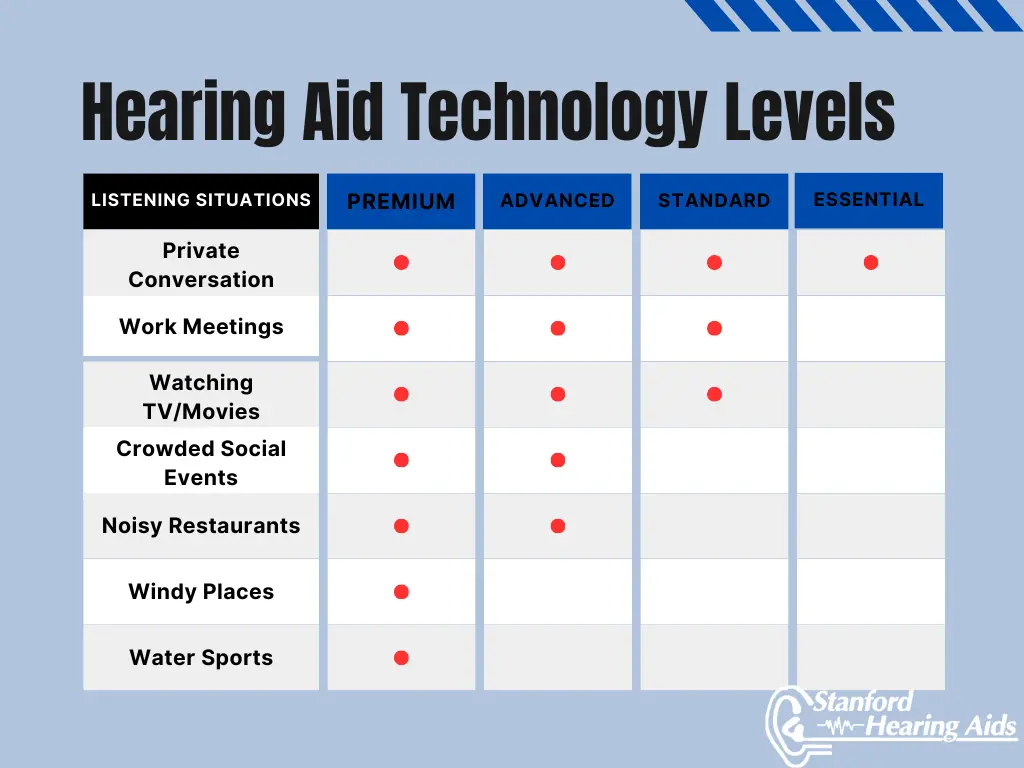Choosing a Hearing Aid Technology Level
Finding the perfect hearing aid can be overwhelming due to the variety of types and technology levels available. This comprehensive guide will help you understand how to choose a hearing aid technology level that fits your needs and lifestyle.
Essential Technology Level
Essential hearing aids are best for quiet environments and simple listening needs. They offer basic automatic features but limited noise-reduction capabilities. These aids are suitable for one-on-one conversations and activities in quiet settings, such as watching TV or listening to the radio.
Standard Technology Level
Standard hearing aids are a step above the essential level, providing more automatic features and slightly improved noise reduction. They are designed for individuals who prefer quiet environments but occasionally find themselves in small group conversations or mildly noisy settings. These aids can help you hear better in quieter restaurants or small gatherings.
Advanced Technology Level
Advanced hearing aids are comparable to the premium models of previous generations. They offer good noise reduction and are suitable for more active lifestyles. These aids come with a wider range of automatic features and customization options, making them ideal for environments such as busy restaurants, churches, or outdoor activities. They also manage wind noise effectively, making them perfect for golfers or beachgoers.
Premium Technology Level
Premium hearing aids represent the latest in hearing aid technology. They come with all the top-end features, including the most advanced noise reduction and automatic adaptation capabilities. These aids are designed for people who need the best possible performance in complex sound environments, such as busy restaurants, meeting rooms, and outdoor activities. They offer exceptional sound quality and clarity, making them perfect for individuals with active lifestyles who frequently find themselves in challenging listening situations. Also, studies show they provide the most satisfaction for their users.
Learn more about speech in noise.
Key Features to Consider
Sound Quality and Clarity
The technology level you choose will significantly impact the sound quality and clarity of your hearing aids. Higher technology levels generally offer better sound processing, resulting in more natural and clear sound. Premium models provide the best sound experience, with advanced algorithms that enhance speech and reduce background noise.
Compatibility with Other Devices
Modern hearing aids often come with Bluetooth connectivity, allowing them to connect seamlessly with smartphones, TVs, and other devices. This feature is particularly important for individuals who frequently use their phones or other electronic devices. Advanced and premium models typically offer the best compatibility and streaming quality.
Future-Proofing
Investing in a higher technology level can ensure your hearing aids remain up-to-date with future advancements. Premium models often come with updateable software and additional features that can be activated as new technologies emerge, providing long-term value.
Assessing Your Lifestyle Needs
Daily Activities
Evaluate your daily activities and typical listening environments. If you spend most of your time in quiet settings, essential or basic technology levels may suffice. However, if you frequently find yourself in noisy environments, such as restaurants, social gatherings, or outdoor activities, advanced or premium levels may be more appropriate.
Severity of Hearing Loss
The severity of your hearing loss will influence the technology level you need. Milder losses might be adequately addressed by basic or essential models, while moderate to severe losses often require advanced or premium features for effective amplification and sound processing.
Budget Considerations
Hearing aid technology levels typically correlate with price. While higher levels offer more features and better performance, they also come at a higher cost. It’s important to balance your budget with your communication needs. Remember that the most crucial factor is an appropriately fit hearing aid, regardless of the technology level.
Choosing the Right Technology Level
Mild Hearing Loss
For those with mild hearing loss, essential or basic technology levels are often sufficient. These models are cost-effective and provide the necessary amplification for quiet environments. They are ideal for simple listening needs and one-on-one conversations.
Moderate Hearing Loss
Individuals with moderate hearing loss should consider standard or advanced technology levels. These models offer better noise reduction and a wider range of automatic features, making them suitable for more diverse listening environments.
Severe Hearing Loss
For severe hearing loss, advanced or premium technology levels are recommended. These models provide superior sound quality, noise reduction, and automatic adjustments, ensuring the best possible performance in all listening situations.
The Importance of Accurate Programming
Regardless of the technology level, accurate programming by a hearing care provider is crucial. A well-programmed hearing aid tailored to your specific hearing loss can significantly enhance its effectiveness. All the advanced features in the world won’t help if your devices aren’t properly programmed.
Real-World Benefits of Hearing Aid Features
Imagine sitting in a busy restaurant with friends. Sounds come from all directions—dishes clanking, people talking, and waiters rushing about. With your new hearing aids, you can clearly hear your friend across the table. The aids reduce impulse noises like silverware clanking, suppress the ventilation system’s hum, and minimize background conversations. They do all this automatically while amplifying your friend’s voice, allowing you to enjoy the conversation effortlessly.

Contact Stanford Hearing for Expert Guidance
Choosing the right hearing aid technology level can significantly impact your quality of life. At Stanford Hearing, our experts are ready to help you find the perfect fit for your needs. Contact us today to schedule a consultation and start your journey to better hearing.

